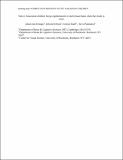| dc.contributor.author | Jara-Ettinger, Julian | |
| dc.contributor.author | Kidd, Celeste | |
| dc.contributor.author | Piantadosi, Steve | |
| dc.contributor.author | Gibson, Edward A. | |
| dc.date.accessioned | 2015-11-23T12:43:33Z | |
| dc.date.available | 2015-11-23T12:43:33Z | |
| dc.date.issued | 2015-10 | |
| dc.date.submitted | 2014-07 | |
| dc.identifier.issn | 1363755X | |
| dc.identifier.issn | 1467-7687 | |
| dc.identifier.uri | http://hdl.handle.net/1721.1/99974 | |
| dc.description.abstract | Cooperation often results in a final material resource that must be shared, but deciding how to distribute that resource is not straightforward. A distribution could count as fair if all members receive an equal reward (egalitarian distributions), or if each member's reward is proportional to their merit (merit-based distributions). Here, we propose that the acquisition of numerical concepts influences how we reason about fairness. We explore this possibility in the Tsimane’, a farming-foraging group who live in the Bolivian rainforest. The Tsimane’ learn to count in the same way children from industrialized countries do, but at a delayed and more variable timeline, allowing us to de-confound number knowledge from age and years in school. We find that Tsimane’ children who can count produce merit-based distributions, while children who cannot count produce both merit-based and egalitarian distributions. Our findings establish that the ability to count – a non-universal, language-dependent, cultural invention – can influence social cognition. | en_US |
| dc.description.sponsorship | National Science Foundation (U.S.). Research and Evaluation on Education in Science and Engineering Program (Grant 1022684) | en_US |
| dc.description.sponsorship | University of Rochester | en_US |
| dc.language.iso | en_US | |
| dc.publisher | Wiley Blackwell | en_US |
| dc.relation.isversionof | http://dx.doi.org/10.1111/desc.12351 | en_US |
| dc.rights | Creative Commons Attribution-Noncommercial-Share Alike | en_US |
| dc.rights.uri | http://creativecommons.org/licenses/by-nc-sa/4.0/ | en_US |
| dc.source | Gibson | en_US |
| dc.title | Native Amazonian children forego egalitarianism in merit-based tasks when they learn to count | en_US |
| dc.type | Article | en_US |
| dc.identifier.citation | Jara-Ettinger, Julian, Edward Gibson, Celeste Kidd, and Steve Piantadosi. “Native Amazonian Children Forego Egalitarianism in Merit-Based Tasks When They Learn to Count.” Dev Sci (October 2015): n/a–n/a. | en_US |
| dc.contributor.department | Massachusetts Institute of Technology. Department of Brain and Cognitive Sciences | en_US |
| dc.contributor.approver | Gibson, Edward A. | en_US |
| dc.contributor.mitauthor | Jara-Ettinger, Julian | en_US |
| dc.contributor.mitauthor | Gibson, Edward A. | en_US |
| dc.relation.journal | Developmental Science | en_US |
| dc.eprint.version | Author's final manuscript | en_US |
| dc.type.uri | http://purl.org/eprint/type/JournalArticle | en_US |
| eprint.status | http://purl.org/eprint/status/PeerReviewed | en_US |
| dspace.orderedauthors | Jara-Ettinger, Julian; Gibson, Edward; Kidd, Celeste; Piantadosi, Steve | en_US |
| dc.identifier.orcid | https://orcid.org/0000-0002-6167-1647 | |
| dc.identifier.orcid | https://orcid.org/0000-0002-5912-883X | |
| mit.license | OPEN_ACCESS_POLICY | en_US |
| mit.metadata.status | Complete | |
